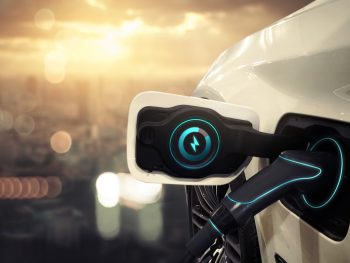UK’s millionth EV registered in January as fleet demand soars
The UK’s millionth battery electric car (BEV) reached the road in January 2024, while the new car market grew and fleet demand continued to soar.

The UK’s millionth battery electric car was registered in January
The first month of the year saw 142,876 new cars registered – up 8.2% or some 10,882 units on January 2023. It’s the best performance for the month since 2020 and the 18th consecutive month of growth.
The increase was driven entirely by the larger fleet market, which rose by 29.9% and accounted for more than six in 10 (63.2%) new cars registered, up from just over half (52.7%) last year.
This compares to a 17.7% fall in demand from smaller fleets with fewer than 25 vehicles. Combined larger and smaller fleet registrations were up 28.8% to 92,632 units from 72,355 in January 2023. Meanwhile, private retail uptake fell 15.8%.
The market also reached its anticipated milestone of a million BEV registrations since records began.
Some 20,935 BEVs were registered in January, up 21.0% year on year, taking the overall total since 2002 to 1,001,677.
BEV market share for January also grew year-on-year to 14.7%, although this is below the full 2023 performance of 16.5%. It’s also below the 22% share that carmakers will be required to hit to avoid fines under the newly implemented ZEV mandate.
Plug-in hybrids (PHEVs) recorded volume growth of 31.1% to take 8.4% of the market, while hybrid (HEV) volumes fell 1.2% with a 13.1% share.
Government must use Budget to support private EV buyer demand
The SMMT said volatility in BEV supply had been expected and was likely to continue as manufacturers adjust product allocation following the last-minute resolution over UK–EU rules of origin, which had threatened to apply tariffs to EVs, restricting affordability.
However, while fleet and business demand for BEVs grew by 41.7% in January, registrations to private buyers fell by 25.1% – an ongoing trend that has led many to call for government-backed incentives to spur consumer demand.
The SMMT said the UK is now the only major market to combine a 2035 ICE ban with a mandated zero emission vehicle market share, but without any significant consumer incentives after the Plug-in Car Grant was scrapped in June 2022.
And it says it’s increasingly clear that private buyers need more support to switch.
Ahead of next month’s Budget, the industry is calling for government to support consumers by temporarily halving VAT on new BEV purchases – this would cost the Treasury an average of £1,125 per car, which is less than the cost of the previous Plug-in Car Grant and would put more than a quarter of a million electric – rather than petrol or diesel – cars on the road by the end of 2026, on top of those already expected.
Mike Hawes, SMMT chief executive, said: “It’s taken just over 20 years to reach our million EV milestone – but with the right policies, we can double down on that success in just another two. Market growth is currently dependent on businesses and fleets. Government must therefore use the upcoming Budget to support private EV buyers, temporarily halving VAT to cut carbon, drive economic growth and help everyone make the switch. Manufacturers have been asked to supply the vehicles, we now ask government to help consumers buy the vehicles on which net zero depends.”
The latest independent outlook for the 2024 new car market estimates a total overall volume of 1.974 million units, which is a 4,000-unit increase on the October estimate, but with the BEV forecast reduced to a market share of 21.0% over the year, compared with the 22.3% anticipated in October and the 23.3% expected a year ago.
The RAC echoed the SMMT’s calls for consumer incentives on BEVs.
RAC head of policy Simon Williams said: “The Government must play its part by stimulating demand at scale and making zero-emission driving more affordable. We urge the Chancellor, in March’s Budget, to reintroduce a form of the Plug-in Car Grant aimed at the cheaper end of the EV market and cut VAT on public chargers to match the 5% rate levied on domestic electricity. This would make charging significantly more affordable for those who can’t charge at home or those who regularly have to recharge on long journeys.”
Deloitte meanwhile said further action on charging was needed to drive EV demand.
Jamie Hamilton, automotive partner and head of electric vehicles, said: “When it comes to electric vehicles, the majority of consumers still remain hesitant due to a number of concerns, including charging infrastructure and price. Deloitte’s Global Automotive Consumer Study, found fewer than one in 10 (9%) would prefer a new and used battery electric vehicle (BEV) as their next car, down from 11% last year.
“This hesitancy around EVs won’t go away unless efforts to install more public charging points near peoples’ homes are accelerated. Our research shows that consumers are more than twice as likely to be interested in an EV if they have access to off-street parking and at home charging facilities.
“Affordability is also an issue, with the majority of consumers (86%) expecting to spend less than £50k for an EV. A number of affordable EV models are expected to enter the market over the next year, which should drive growth in this sector.”
And Jon Lawes, managing director at Novuna Vehicle Solutions, warned that political uncertainty around future commitments to developing green infrastructure threatens to undermine confidence for drivers to make the switch.
He added: “Rather than political posturing, we need collaboration at national and local level, to build a robust and accessible network of fast public chargers and ensure the UK is capable of delivering its net zero ambition.”
new car registrationsSociety of Motor Manufactures and Traders (SMMT)












